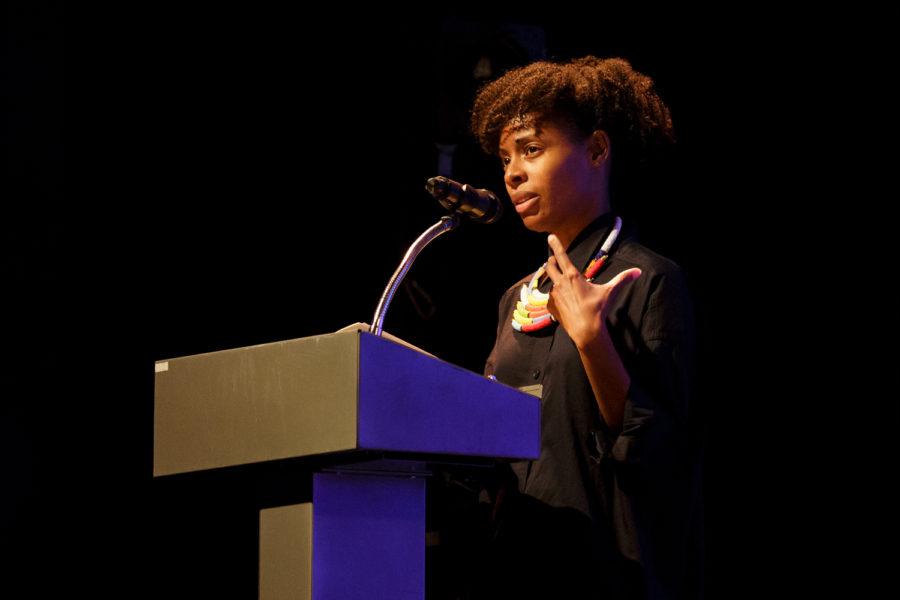CAAPP celebrates black female writers from Pittsburgh and beyond
Poet Nicole Sealey reads her poem “Candelabra With Heads” at Pitt’s Center for African American Poetry and Poetics “Won’t You Celebrate With Me” event on Saturday evening.
June 18, 2019
Nicole Sealey’s editors once convinced her to remove the last line of a poem before she published it. The poem, “Candelabra With Heads,” meditated on a sculpture by the artist Thomas Hirschhorn, and its final line stated the poem’s thesis question — “Who can see this and not see lynchings?”
Sealey added the line back in for its next publication, she said.
Her audience of about 50, sitting in the Kelly Strayhorn Theater, cheered.
Sealey read both “Candelabra With Heads” and a later work, “In Defense of ‘Candelabra With Heads,’” at a Saturday night reading hosted by Pitt’s Center for African American Poetry and Poetics. The event’s name, “Won’t You Celebrate With Me” comes from the title of a poem by two-time Pulitzer Prize-nominated poet Lucille Clifton, who wrote in 1993, “won’t you celebrate with me / what i have shaped into / a kind of life? i had no model. / born in babylon / both nonwhite and a woman / what did i see to be except myself?”
The four women on stage shaped rich, successful lives and careers out of often humble beginnings. Advertised as an evening of “poetry and prose from the director’s chair,” “Won’t You Celebrate With Me” celebrated black female writers who lead various writing-centered foundations and university departments across the country.
Sealey was joined by Salamishah Tillet, the associate director of the Price Institute at Rutgers University — Newark; Dawn Lundy Martin, CAAPP’s co-founder and director and Mahogany Browne, the artistic director of Urban Word NYC and co-founder of the “poetic protest” Black Poets Speak Out.
After each of the four writers featured had the chance to read a selection from her own work, they gathered back onstage for a roundtable moderated by Amanda Johnston, the executive director of Torch Literary Arts — an organization which supports the work of black female creators.
Johnston asked the women whether they feel a greater responsibility to write about issues of race and gender when those issues are having a “moment.”
“When we come to the page and we start writing about issues on race, gender, identity, especially in this #MeToo, Black Lives Matter era, do you feel a sense of responsibility to that?” Johnston asked.
Sealey said decidedly that no, she doesn’t.
The executive director of the Cave Canem Foundation, an organization which supports black poets, and the winner of the 2019 Rome Prize in Literature, Sealey has written extensively about race and gender. But her need to write about those things comes from a greater place than this specific cultural moment, she said.
“Two of my great passions are black people and poetry, and so I explore those things in my everyday life,” Sealey said. “Even before I was writing poetry, I was thinking about equity and so that shows itself in my creative work. So while these movements are happening, I think when they stop, if they stop — I hope they don’t stop — I’ll still be exploring these issues.”
Tillet said the modern “moment” that black feminism is having makes it easier for the public to understand her work and the work of other black women.
“I think it makes the work that I do easier. There’s a vocabulary, there’s a prevailing discourse,” Tillet said. “I actually think black feminism is a deeply prophetic tradition. Sometimes I think the moments and the movements catch up to these prophetic artists and that’s why it’s easier, because the moment has caught up to those artists who have been trying to say it for a very long time.”
Tillet has authored three books and is in the process of writing two more, one on the musician Nina Simone and one on Alice Walker, the author of the influential 1982 novel “The Color Purple.” Early on, Tillet read an excerpt from the latter project, recounting the story of a meeting between Walker and Tillet in Walker’s home.
Tillet said Walker is one of those “prophetic” artists whom she thinks about. Celie, the novel’s heroine, endures an agonizing amount of physical and sexual abuse at the hands of the men in her life before finally finding freedom, escaping into a new life with her female lover and Celie’s estranged sister.
“Celie became, for me, an epitome of the suffering and salvation that lay ahead for us black girls in 20th century America,” Tillet read.
Salvation was not an uncommon theme in the works read. Even Sealey’s “In Defense of ‘Candelabra With Heads,’” part explanation, part prayer, ends with a dream of a day a hundred years in the future when another black woman contemplates Hirschhorn’s sculpture.
“May that lucky someone be black / and so far removed from the verb lynch that she be / dumbfounded by its meaning,” Sealey’s poem read. “May her imagination, not her memory, run wild.”








